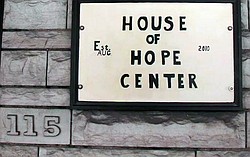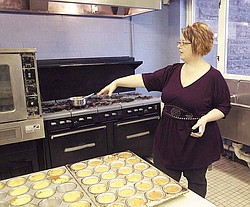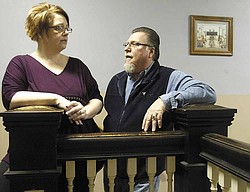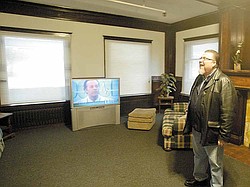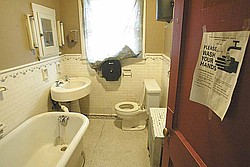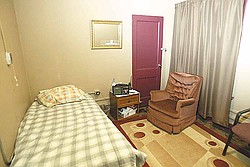Renewed hope
The Vindicator (Youngstown)
Charlene Crissman, administrator and part-owner of House of Hope, stands in the kitchen of her facility in Youngstown.
The Vindicator (Youngstown)
Charlene Crissman, administrator and part-owner of the House of Hope in Youngstown, talks with the Rev. Roy Barnett, executive director of the Ohio Valley Teen Challenge, at the House of Hope's Youngstown facility.
The Vindicator (Youngstown)
The Rev. Roy Barnett, executive director of the Ohio Valley Teen Challenge, stands in the living room of the House of Hope in Youngstown. Clients from Teen Challenge painted part of the interior of the group home.
The Vindicator (Youngstown)
A bathroom in Hope House in Youngstown.
The Vindicator (Youngstown)
A resident's room in the House of Hope in Youngstown.
By DAN POMPILI
TheNewsOutlet.org
YOUNGSTOWN
A house on Illinois Avenue is filled with more hope than usual these days.
While the Ohio Department of Health is pursuing injunctions to close the beleaguered House of Hope, some community members are rallying around the troubled adult-care facility.
Immediately after The Vindicator published a series of articles in January chronicling the home’s recent trials and tribulations, Pastor Roy Barnett and Bruce Paulette of Ohio Valley Teen Challenge contacted the facility’s administrators with an offer to help.
Teen Challenge was also the subject of a Vindicator series last fall.
“It only takes one to get involved and make a difference,” said Barnett, the executive director of the faith-based drug-treatment program. In recent weeks, Teen Challenge has sent many of its 48 resident volunteers the two blocks from the corner of Florencedale Avenue and Broadway to House of Hope, 115 Illinois Ave., to clean and paint much of the first floor.
As a result, the dining area is now bright and welcoming. Bathrooms, pictured as dilapidated in photos taken during November and December inspections, are also under renovation.
Lowe’s Home Improvement in Boardman has provided about 40 gallons of paint and other materials for the project, and Paulette, Teen Challenge’s director of development, said the store has committed to future donations.
Teen Challenge advisory board member Budd Brothers also sits on the newly formed board of directors for House of Hope. The board was formed about two weeks ago, when House of Hope determined it would convert to a nonprofit organization. Currently only Brothers and Paulette sit on the board, but administrators say the formation is ongoing.
By switching from a limited liability company to nonprofit status, House of Hope will be eligible to apply for grants and financial aid for which they do not now qualify.
Lisa Lloyd, administrator and co-director of care, said the home isn’t making a profit anyway, so the new plan makes the most sense to get the House of Hope the help it needs.
Brothers has donated an eight-burner stove to the facility, and he and Paulette provided an updated freezer, three ovens, new steam tables and new food trays for the home. Though not all the equipment is new, it is all in good condition and an improvement over what the home had previously. Paulette estimated the donations are worth between $5,000 and $6,000.
“If [the ODH] will just back off for a little bit and give us some time,” Brothers said, “they’ll see the residents will have everything they need there to make it a first-class act.”
Lloyd said since Teen Challenge got involved, the home’s administrators are less worried.
“It’s like a peace has come over the building,” she said.
Brothers and Teen Challenge are not the home’s only advocates.
City Councilwoman Annie Gillam, D-1st, spoke to the legal department at the Ohio Department of Health on Feb. 14 to ask for more time for the home to make corrections.
“I want them to have a fair chance as long as they’re doing what they need to do,” Gillam said.
Gillam expressed concerns over the condition of the mental-health care system since the closing of Woodside Receiving Hospital for the mentally ill in 1999. Some of House of Hope’s residents are former Woodside patients.
“If they don’t follow the rules, then they should be shut down,” Gillam said. “But if they have new people, they should be given a chance” to make corrections.
Lloyd said the facility is asking the state to give them sufficient time to implement changes.
“We’ve made so many improvements, but they’re not even giving us a chance,” she said. “Everyone is portraying us as slumlords, and we’re not.”
Lloyd said House of Hope has had the operation license since August 2010, when it was transferred from Bryson Manor owner Robert Van Sickle. The facility was overdue for investment and improvements when they took over.
Barnett said the facility has improved under the new ownership. He used to visit the home in the late 1990s when he worked for Biomedical Labs in Liberty, and the home was still called Bryson Manor. He said back then the home smelled like smoke and he observed little supervision.
Owner/Administrator Charlene Crissman provided copies of eight letters of support written by family members of residents and health professionals with patients living at House of Hope. The letters argue that closing the home would be “a disaster” for the residents and the community.
Since January, however, Lloyd said families or case workers have removed 14 residents from the home. They estimate the financial impact at about $12,000 to $14,000 per month, while many operating costs remain essentially the same.
Crissman and Paulette said the payroll cost comprises the largest percentage of expenses, though they would not release specific numbers. Paulette attacked the state health department’s contention the facility is inadequately staffed.
That contention was included in recent correspondence with the home, including a Feb. 3 letter informing Crissman of the state’s plan to revoke House of Hope’s license
Lloyd said they keep two caregivers on shift at all times and have added one more to the midnight shift. She said all her staffers are trained in first aid and CPR, a fact House of Hope lawyer James J. Leo included in his appeal letter to the state.
Staffing, however, is not the state’s only complaint against the home. The ODH has charged that various conditions within the home constitute a “real and present danger” to the residents. Lloyd and Crissman disagree.
The two administrators say the state’s case against them began in early 2009 when Bryson Manor won a decision in Mahoning County Common Pleas Court after ODH nearly revoked the license.
Crissman said she knew the state health department would “come after us with everything they’ve got.” Since then the home has been cited repeatedly for minor infractions, she said.
Among the citations listed as evidence of “real and present danger” at the home, an inspector found lighter fluid in a resident’s room and deemed it a safety violation. The state specifically ordered House of Hope to confiscate the lighter fluid.
Lloyd and Crissman, however, said the investigator could not tell them for certain if they could legally take a resident’s personal property.
“When do we go over the line of their rights?” Lloyd asked. “They do have rights … and now we’re treating them like they’re in jail.”
John Saulitis, an ombudsman for Area Agency on Aging 11 and an outspoken critic of the facility, said residents need to be treated as individuals.
“It is contingent on an assessment of the person,” he said. “Are they a safe smoker?”
Saulitis said he successfully fought a facility that attempted to evict a resident for refusing to surrender his lighter and cigarettes. In that case, the resident was determined to exhibit safe-smoking behavior and could not be forced to surrender personal property.
Lloyd said the state has taken the case of a small can of lighter fluid for a patient’s lighter “way too far.”
Ultimately, both administrators said, it comes down to their residents. The 46 residents who remain have been upset and are questioning administrators about the home’s future.
“The residents have been in tears about ‘Will we have a home?’” Lloyd said. “We’re trying to assure them we’re not [going to] close.”
Lisa Solley, also an ombudsman for Area Agency on Aging 11, said House of Hope’s recent efforts deserve acknowledgment but do not solve all the facility’s problems.
“I applaud their efforts to try to improve the facility, and I hope that continues,” she said. “But I think [the case] goes beyond cosmetic issues, and I hope they improve the problems with staffing and the health and safety issues.”
Saulitis said the problems at the home are serious and the state’s case should not be taken lightly.
“A finding of real and present danger does not happen very often. It’s as serious as it gets,” he said.
Still, Crissman said the men from Teen Challenge are the home’s saving grace.
“They’ve stepped up above and beyond. It’s like a rebirth,” she said.
Paulette said he has roofers living in the Teen Challenge residence who plan to assess roof damage. They also plan to completely renovate the landscaping around the house.
Barnett said he and his men are proud to be helping the home.
“These people have the same drive as Ohio Valley Teen Challenge,” he said. “We’re here trying to help people.”
No actions have been taken yet in Mahoning County Common Pleas Court, where ODH has filed an injunction to close the home.
Tess Pollock, a public relations officer with ODH, said a phone conference is scheduled Friday, during which a date will be set for the administrative hearing on House of Hope’s license revocation.
The NewsOutlet is a joint media venture by student and professional journalists and is a collaboration of Youngstown State University, WYSU radio and The Vindicator.
 43
43

